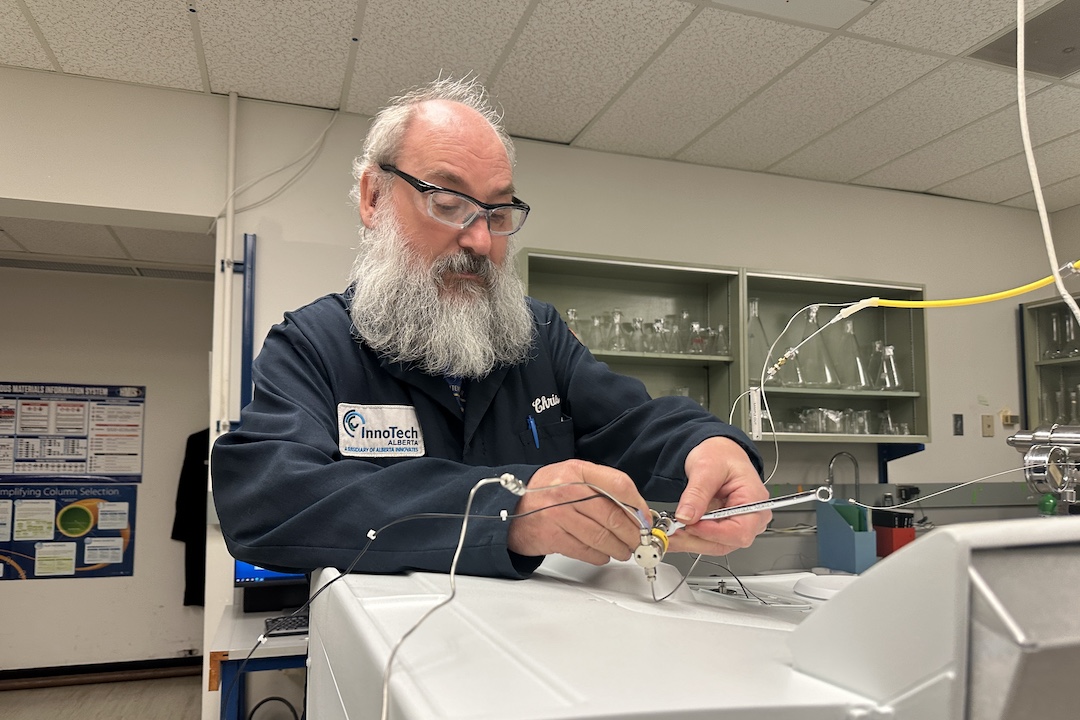InnoTech Alberta's new Hydrogen Quality Centre at Edmonton Research Park can test for impurities better than any other lab in Canada, meaning industry can now validate its hydrogen for fuel cells much closer to home.
"We can measure and detect various types of impurities that are specified in global specification for fuel-cell grade hydrogen," Martin Huard, the hydrogen lead at InnoTech told Taproot. "That's really the most difficult standard to test to, because the levels of impurities in hydrogen for that application are very, very low."
Huard said the region has produced hydrogen at a massive scale for decades for uses in petrochemical refining and fertilizer production. But now, producing fuel-cell grade hydrogen is promising for the region's economy because of its commercial applications for vehicles.
"What we're seeing in recent years is many companies in the Edmonton region … start to produce, supply, and use hydrogen specifically for fuel cells in vehicles, locomotives generators, and other applications," Huard said. "The tricky part is that when hydrogen is used in fuel-cell devices, it has to meet very stringent global quality standards, with very low levels of impurities to prevent fuel cells from being damaged or degrading their performance."
He also said this is useful for the local industry because it previously had to ship hydrogen to California or New Jersey for tests at this level. Having a local option should make testing cheaper and faster. Huard said it should help prevent hydrogen from becoming more expensive.
InnoTech received $600,000 through its parent company Alberta Innovates's Hydrogen Centre of Excellence arm to create the centre. The decision was made in April 2022 and the investment was made in summer 2023. Innotech also got in-kind equipment contributions from PerkinElmer. The centre uses advanced, custom-modified scientific equipment for chemical processes that identify impurities. To get technical, that includes gas chromatographs and Fourier transform infrared spectroscopy to find halogens that dilute hydrogen's purity.
"We expect in coming years, private commercial labs will likely start providing this kind of service as well," Huard said. "We're here to transfer knowledge to them as we gain experience running the test methods that go with this equipment."
Even though Huard's team is operating at the highest testing level in the country, he's already identified "gaps and deficiencies" that centre employees will work to improve.

Chris Goss, a research technologist at InnoTech Alberta, demonstrates testing equipment at the new Hydrogen Quality Centre, Canada's most advanced quality testing lab. (Supplied)
"Our intention is to continue to innovate, recommend modifications to test methods, potentially develop new test methods altogether, and ultimately try to make hydrogen quality testing more accurate, cheaper, and more widely available," Huard said.
Hydrogen is a tiny molecule with low density, Huard said. It can ignite very easily and has a high flammability range in the air. Huard said the centre's safety standards mean it can handle "undesirable" events that can occur during tests.
The centre opened on April 25 during the Canadian Hydrogen Convention, when 50 delegates toured the facility. "They were very impressed with the state and conditions of the labs that they visited," Huard said.
Other developments at the convention include $57 million in investment from Alberta Innovates and Emissions Reduction Alberta for 28 projects ranging from a cryo-compressed hydrogen demonstration by Verne to Strathcona County's installation of a hydrogen-fuelled combined heat and power system at the Millennium Place recreation centre. Another Alberta Innovates subsidiary, C-FER Technologies, signed a memorandum of understanding with Taiwanese company Metal Industries Research and Development Center to further hydrogen pipeline technology.
On May 8, the city announced its inaugural Edmonton Edge Fund recipients, including $100,000 for Dark Matter Materials to develop a catalytic hydrogen generator.
